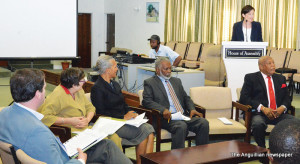
The Public Accounts Committee (PAC), which was set up by the Anguilla House of Assembly earlier this year may, at times, like other such committees elsewhere, appear to strike fear in the minds of persons appearing before it to give financial evidence. In reality, however, such a body should not be regarded as an instrument of terror. In fact, it is to ensure that the people’s money, paid in taxes and fees, is properly spent and accounted for – and that there is good governance in Anguilla.
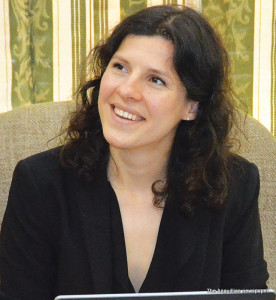
That is the core of instructive and learning concepts coming out of a three-day interactive workshop held in the Anguilla House of Assembly on Monday, Tuesday and Wednesday this week. The event was one of the most serious moves towards the establishment and effective working of a well-organised and functioning Public Accounts Committee in Anguilla. The workshop sessions were attended by Parliamentarians, Permanent Secretaries, Heads of Departments, Accounting Officers, other Senior Public Servants, members of the Youth Parliament, Media and Civil Society representatives.
The workshop was part of a Parliamentary Partnership Programme involving the UK, Anguilla and the Commonwealth Parliamentary Association. The UK delegation comprised Fiona Mactaggart, Labour MP and Member of the Intelligence and Security Committee; Kevin Foster, Conservative MP and Member of the Public Accounts Committee; Fay Buckle, Clerk of the Welch Assembly’s Public Accounts Committee of the National Assembly for Wales; and Helen Gardner, Programme Officer, International Outreach Team, CPA UK. The workshop was funded by the Governor’s Office in Anguilla and the CPA UK.
Speaking at the opening ceremony, Governor Christina Scott, who was a former Senior Civil Servant in the UK, and had experience in Public Accounts Committee matters, said it was “very hard to overstate the importance of the Public Accounts Committee to a flourishing parliamentary democracy.” She went on: “There is nothing more intimidating than being a senior official with responsibility for budget and knowing that the decisions you take about that budget, the advice you give to Ministers, and the quality of that advice, would be scrutinised publicly and registered in a way that can be accessed and read by journalists, others in the media and the public. [Further], that every decision you take is potentially subject to inquiry.”
She said the PAC “takes advice not just from Ministers and Civil Servants, but from a wide range of organisations that can bring fresh ideas and debate to the quality of inquiry the PAC is doing. In addition, “it can help challenge and keep all persons on their toes in terms of quality of advice and spending of money.”
Chief Minister and Minister of Finance, Mr. Victor Banks, said the workshop had been long in coming; that it not only impacted elected officials, but also everybody down the chain in the public service. It includes “anyone who has anything to do with providing and delivering services to the people of Anguilla, the cost of those services; projects; and anything that requires expenditure from the public purse.”
Mr. Banks continued: “This workshop will be an eye-opener to many of us, including myself. We have had Public Accounts Committees for many, many years. They have not functioned. To my mind, I think we need to do some restructuring and reconfiguration of how a Public Accounts Committee should work in a small state…It is an important issue and we all have to get together and understand what our specific goals are in the scheme of things.”
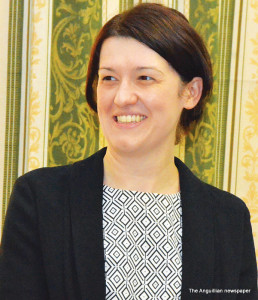
Mr. Leroy Rogers, Speaker of the Anguilla House of Assembly, said the Public Accounts Committee was very important in a parliamentary democracy; and that such a committee in Anguilla had never functioned because many of the members did not know how to function. He was pleased that the entire committee in Anguilla, including the Clerk of the House, and a member of the Youth Parliament, were sent to the UK earlier this year to observe the workings of a Public Accounts Committee. He was grateful to all who contributed to this week’s workshop sessions in Anguilla.
Leader of the Opposition, Ms. Palmavon Webster, was fortunate to be the chairperson of the Public Accounts Committee, working with such able colleagues as Mrs. Evalie Bradley, Ministerial Assistant; Mr. Terry Webster, First Nominated Member and Deputy Speaker; and Mr. Paul Harrigan, Second Nominated Member. Ms Webster obeserved:
“In Anguilla, as in other parts of the Commonwealth Caribbean, we often associate the Public Accounts Committee with witch-hunting and the pursuit of political opponents.” She continued: “Sadly, it has been considered more in the nature of a political weapon than as a tool to call Government to account and ensure that public monies are properly spent and properly accounted for. In fact, our Constitution, in the tradition of our parliamentary model, envisages the use of the Public Accounts Committee to investigate, to advise and to consider complicated issues…”
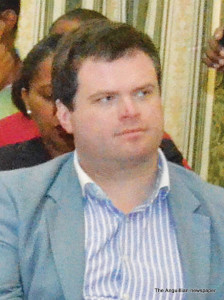
The Opposition Leader said that during her tenure, as Chairperson, she would make “a committed effort to bring the work of the Committee in line with the dictates of the Constitution and the aspirations of our people.” She added: “For the Anguilla public, we want more transparency and they [the people] are requiring each of us to be more accountable. The Anguilla Public Accounts Committee will take bold steps in that direction…ensuring good governance in Anguilla.”
Mrs. Fiona Mactaggart, the UK MP, told the gathering: “What we are trying to do is to operate on a peer to peer basis to share what we found out in a mature Public Accounts Committee, and to see if that can help you. The Public Accounts Committee was the first ever Committee in the UK Parliament. It is 150 years old and is the most powerful committee. and I think that the Governor’s description of the fear which does exist in public servants, about appearing before Public Accounts Committees, is true. But it is also true that it shouldn’t be used as an instrument of terror. It actually should be used as an instrument of enlightenment – the mechanism to ensure that taxes, which we pay, are properly spent. That’s the first job of Government. I think wasting public money is theft. Actually, what we need to do is to ensure that public money is efficiently and effectively spent.”
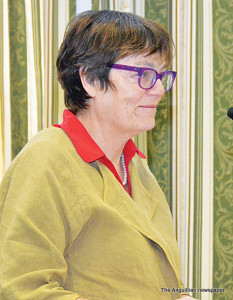
The British MP stressed: “The way that we provide education or infrastructure, or anything else, is through spending the money which the public contributes…to a civilised society…,but if the people who are spending that money don’t do it efficiently and effectively, they are letting us down. That’s a reason why Public Accounts Committees firstly have a chair who is not a member of a governing party. That is really an important thing – not because it means that the Public Accounts Committee should be used as a tool of terror. It means that there has to be a bit of healthy scepticism, a bit of independence; a bit of stepping back and saying, ‘come on, chaps, what’s the truth here?’ That’s the most powerful thing about a Public Accounts Committee.”
The objectives of the workshop were outlined as follows:
“Provide a comprehensive introduction of the role and functions of the Public Accounts Committee to the Speaker and Members of the Anguilla House of Assembly, Accounting Officers and Permanent Secretaries of Government departments and other relevant stakeholders.
“Facilitate discussion, build relationships and understanding between the Public Accounts Committee and relevant partners such as the Audit Office, Accounting Officers, and Government departments on their role and remit, in relation to the Public Accounts Committee ; and facilitate discussion to create a framework for the implementation of international good practice on oversight of the Executive related to Public Accounts in an Anguillian context.”








